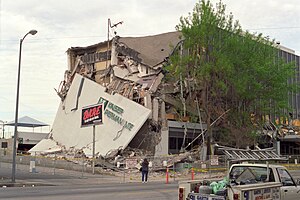
In seismology, a buried rupture earthquake, or blind earthquake, is an earthquake which does not produce a visible offset in the ground along the fault (as opposed to a surface rupture earthquake, which does). When the fault in question is a thrust fault, the earthquake is known as a blind thrust earthquake.

Ground motion
Recorded ground motions of large surface-rupture earthquakes are weaker than the ground motions from buried rupture earthquakes.
Depth
The asperity for a buried rupture earthquakes is in area deeper than roughly 5 kilometres (3.1 mi). Examples are the Loma Prieta earthquake, Northridge earthquake, and the Noto Hanto earthquake.
Tsunamis
As compared to the seabed surface rupture case, uplifted water outside the fault plane in buried rupture earthquakes makes for large tsunami waves.
See also
References
- ^ "Observed differences in ground motions" (PDF). IJR. Retrieved 30 October 2018.
- Wada, K; Goto, H. "Generation Mechanism of Surface and Buried Faults Considering the Effect of Plasticity in a Shallow Crust Structure" (PDF). iitk.ac.in. Retrieved 31 October 2018.
- Goda, Katsuichiro (October 2015). "Effects of Seabed Surface Rupture Versus Buried Rupture on Tsunami Wave Modeling: A Case Study for the 2011 Tohoku, Japan, Earthquake". Bulletin of the Seismological Society of America. 105 (5): 2563–2571. Bibcode:2015BuSSA.105.2563G. doi:10.1785/0120150091. hdl:1983/ab80d036-71a5-45e6-a26c-180964d589f4. Retrieved 29 October 2018.
External links
 Media related to Buried rupture earthquakes at Wikimedia Commons
Media related to Buried rupture earthquakes at Wikimedia Commons- Differences in ground motion and fault rupture process between the surface and buried rupture earthquakes
This seismology article is a stub. You can help Misplaced Pages by expanding it. |